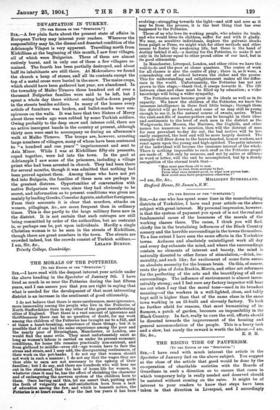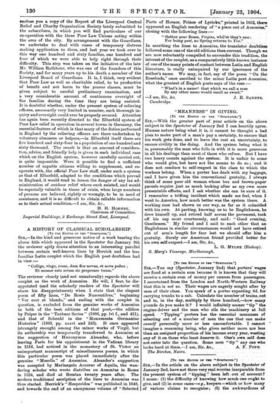THE RISING TIDE OF PAUPERISM.
[To THE EDITOR OF THE "SPECTATOR."' Sia,—I have read with much interest the article in the Spectator of January 2nd on the above subject. You suggest at the close of the article that good would be done by the co-operation of charitable societies with the Boards of Guardians in such a direction as to ensure that cases in which temporary help is really needed and deserved should be assisted without coming on the rates. It might be of interest to your readers to know that steps have been taken in that direction in Liverpool, and I accordingly
enclose you a copy of the Report of the Liverpool Central Relief and Charity Organisation Society lately submitted to the subscribers, in which you will find particulars of our co-operation with the three Poor Law Unions acting within the area of the city. By arrangement with the Guardians, we undertake to deal with cases of temporary distress making application to them, and last year we took over in this way one hundred and sixty families, one hundred and four of which we were able to help right through their difficulty. This step was taken on the initiative of the late Mr. William Rathbone, who was one of the founders of this Society, and for many years up to his death a member of the Liverpool Board of Guardians. It is, I think, very evident that Poor Law as well as charitable relief, to be productive of benefit and not harm to the poorer classes, must be given subject to careful preliminary examination, and a very considerable amount of continuous oversight of the families during the time they are being assisted. It is doubtful whether, under the present system of relieving officers, necessarily very limited in number, such thorough in- quiry and oversight could ever be properly secured. Attention has again been recently directed to the Elberfeld system of Poor Law relief in operation in several towns in Germany, the essential feature of which is that many of the duties performed in England by the relieving officers are there undertaken by voluntary almoners or helpers,—in Elberfeld itself there are five hundred and sixty-four in a population of one hundred and sixty thousand. The result is that an amount of considera- tion, advice, and friendly help is given in each individual case which on the English system, however carefully carried out, is quite impossible. Were it possible to find a sufficient number of capable citizens willing to supplement, and co- operate with, the official Poor Law staff, under such a system as that of Elberfeld, adapted to the conditions which prevail in England, it would tend to lessen the danger of any lax ad- ministration of outdoor relief where such existed, and would be especially valuable in times of crisis, when large numbers of persons are believed, rightly or wrongly, to be in need of assistance, and it is so difficult to obtain reliable information as to their actual condition.—I am, Sir, &c., H. H. HORNBY, Chairman of Committee.
Imperial Buildings, 2 Exchange Street East, Liverpool.











































 Previous page
Previous page